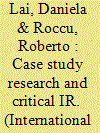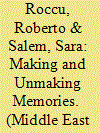|
|
|
Sort Order |
|
|
|
Items / Page
|
|
|
|
|
|
|
| Srl | Item |
| 1 |
ID:
164835


|
|
|
|
|
| Summary/Abstract |
Discussions on case study methodology in International Relations (IR) have historically been dominated by positivist and neopositivist approaches. However, these are problematic for critical IR research, pointing to the need for a non-positivist case study methodology. To address this issue, this article introduces and adapts the extended case methodology as a critical, reflexivist approach to case study research, whereby the case is constructed through a dynamic interaction with theory, rather than selected, and knowledge is produced through extensions rather than generalisation. Insofar as it seeks to study the world in complex and non-linear terms, take context and positionality seriously, and generate explicitly political and emancipatory knowledge, the extended case methodology is consistent with the ontological and epistemological commitments of several critical IR approaches. Its potential is illustrated in the final part of the article with reference to researching the socioeconomic dimension of transitional justice in Bosnia and Herzegovina.
|
|
|
|
|
|
|
|
|
|
|
|
|
|
|
|
| 2 |
ID:
121768


|
|
|
|
|
| Publication |
2013.
|
| Summary/Abstract |
Starting from the empirical distinction between 'discontented' and 'dispossessed' created by processes of accumulation by dispossession necessary for neoliberalism to succeed, this paper suggests how the broader historical-geographical framework developed by David Harvey helps us make sense of the 2011 Egyptian revolution. The paper focuses on the underlying tension between the ever more frequent encroachments of 'the molecular processes of capital accumulation in space and time' within the political sphere and the persisting relevance of forms of territorial government and governance for the success of capital accumulation itself. This seeming contradiction allows us to account both for the penetration of neoliberalism in Egypt and for the different forms of hybridisation and domestication that accompanied it. It suggests that, by looking at the social consequences of neoliberalism, one can see a sharp class polarisation, with the emergence of both a private capitalist oligarchy and embryonic forms of alliance between the dispossessed and the discontented, which had a central role in the 2011 revolution. This perspective also permits us to go beyond the dominant liberal narrative of the Arab Spring focusing on demands for freedom (horreya) and democracy (dimuqratya), recovering the neglected yet vital dimension of social justice ('adala igtimaya).
|
|
|
|
|
|
|
|
|
|
|
|
|
|
|
|
| 3 |
ID:
167655


|
|
|
|
|
| Summary/Abstract |
Trapped in the premises of the transition ‘paradogma,’ democratization and authoritarian persistence literature are limited by a linear and continuous understanding of time, a gradualist view of transition, and a procedural definition of democracy. These analytical and normative strictures are compounded by a methodological nationalism that prevents an appreciation of how global factors shape the parameters for political transformation in the contemporary Middle East. Inspired by Gramsci’s theory of history, this article seeks to move beyond these limitations and explore the prospect of transition as rupture, away from democratization as strategy for ensuring duration of capitalist time, and toward democratic transition as epochal change beyond capitalism. By counterposing the effects of the two globalizations and the decolonization in between on the prospects of political transformation in the Middle East, this article argues that the Arab uprisings provide an opportunity for thinking globally and rupturally about political time, transition and democracy in the region.
|
|
|
|
|
|
|
|
|
|
|
|
|
|
|
|
| 4 |
ID:
167654


|
|
|
|
|
| Summary/Abstract |
Memory-making and the use of memory is always political, and more visibly so in times of crisis, conflict and transition. The current situation in the Middle East and North Africa is no exception to this, where we have seen history, and specific narratives stemming from it, being mobilized toward certain political goals. In taking time as a distinct analytical category, this special issue aims to show that its explicit consideration transforms the ways in which we understand current political dynamics in the Middle East and North Africa. Both memory and time can be illuminating in drawing connections between the political, the economic and the social, thereby shedding new light on old conflicts on the one hand, and bridging the gap between the political and the social/cultural on the other.1
1 Alon Confino (1997Confino, A. (1997) Collective Memory and Cultural History: Problems of Method, American Historical Review, 102(5), pp. 1386–1403.
[Crossref], [Web of Science ®] , [Google Scholar]
) Collective Memory and Cultural History: Problems of Method, The American Historical Review, 102(5), pp. 1386–1403.
View all notes
As Charles Tilly noted, the politics of memory can tell us about both shared historical experiences and their effects on politics today, as well as the contestation or coercion over interpretations of the past—and present.2
|
|
|
|
|
|
|
|
|
|
|
|
|
|
|
|
|
|
|
|
|